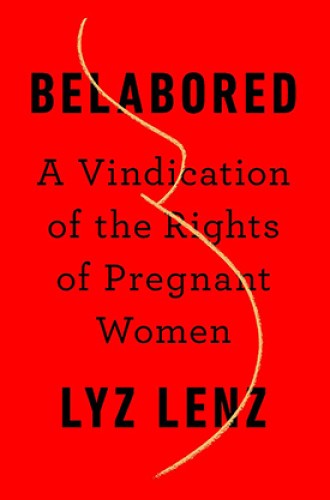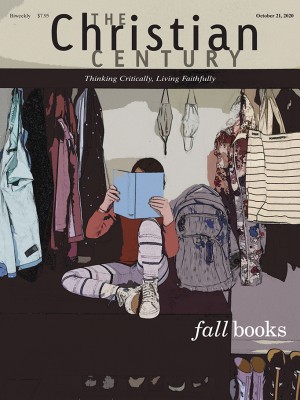Lyz Lenz’s midrash on pregnancy and motherhood
Lenz blends storytelling and critique to explore the role of myths in defining women’s bodies.
As I’ve taught various religion and bioethics classes over the years, I have often felt that something was missing from the reading list. In reading Lyz Lenz’s new book, I realized what that something is: a woman’s perspective on being a body—a pre-pregnant body, a pregnant body, and a motherhood body, each of which is the subject of public debate and legislation.
Lenz presents this embodied perspective as a memoir of her own pregnancies, organizing the book around the four trimesters of pregnancy (the fourth being the first three months of a baby’s life outside the womb). Along the way, she incorporates critical commentary on the medical establishment, power, religion, and the use of technology and science. Her storytelling and critique, which she successfully blends together into a single voice, focus on the role of myths in defining women’s bodies. In describing her method, she writes, “This book is an attempt to midrash the experience of motherhood.”
Read our latest issue or browse back issues.
Midrash seems like just the right word to describe the way Lenz combines personal experience and social criticism. She forefronts women’s experiences as the interpretive lens for rethinking the practices and institutions that govern women’s bodies. These experiences show the need for revisiting the biblical myths that are so often appealed to in discussions of womanhood and motherhood. These include the creation myth, in which a male-gendered God cobbles together a woman from part of the man’s body, and the story of the Fall, which assigns women the pains of pregnancy, labor, and mothering as punishment for Eve’s sin of eating the wrong thing at the wrong time.
Early in her description of the social and bodily experience of the first trimester, Lenz writes, “Congratulations, you are now more myth than human.” This punchy sentence captures her voice perfectly. “Congratulations” feels sincere, but it also marks the pregnant woman’s transformation into an object that is constantly projected onto and put into no-win situations. If she exercises, she is endangering the baby; if she doesn’t exercise, she is endangering the baby. If she eats food she craves, she endangers the baby by focusing on her own needs; if she doesn’t listen to her food cravings and fulfill them, she’s ignoring the baby’s needs. Various binds present themselves over and over again to pregnant women. Their bodies are no longer their own. They belong to the baby and to the public.
Lenz notes how the relinquishing of her own body to potential motherhood and to the public began in the church, particularly through evangelical teachings around sexuality and marriage. From purity rings to necessary suffering during pregnancy, conservative Christian interpretations of the biblical stories of creation and the Fall have left their marks on women’s bodies. Sometimes these marks are insulting and erode women’s agency. Other times, especially in the context of health-care disparities in marginalized communities, these marks lead to death.
While Lenz is forthright about how hard it is for her to navigate a medical system influenced by the biblical creation myth, she also acknowledges that it is far harder for those who, unlike her, are Black, Brown, queer, trans, fat, or poor. While all pregnant women end up in no-win binds, there is also an ideal type of mother. She is young, white, virginal, focused on her baby, and the caretaker of her husband.
What are women to do in this dehumanizing system? Lenz has two suggestions: reclaim our bodies and write new myths.
Throughout the book, Lenz mentions instances of reclaiming her body. She eats deli meat while she’s pregnant because she craves it. She exercises while pregnant because it makes her feel alive. She exercises as a mother because it reminds her that her muscles and joints are hers and they help her do things in the world; she is not only a body that provides for her children. Lenz finds a way to be a body on her own terms.
Writing new myths seems like a big task. But Lenz’s midrashic method points in the direction of rewriting myths we already have by inhabiting different characters’ perspectives and reframing their actions. What if we didn’t see punishment all over the biblical creation stories? What if Eve’s eating of the fruit was an act of liberation? What if the knowledge the serpent possessed was necessary for humans, too?
I want us to tell stories about how Eve is allowed to eat. How her desire for that fruit is not a curse but a gift. How her hunger is her wholeness. How her consumption and her fullness are part of her power, not its destruction. . . . I want a story in which Eve slurping the juices of that fruit is an act of protest and fulfillment. And I want us not just to tell these stories but also to braid them into our cultural mythology.
With these kinds of suggestions, Lenz puts herself in the company of feminist biblical scholars like Tikva Frymer-Kensky and Phyllis Trible, while also arguing for the priority of women’s embodied experiences as central to the task of reading, reinterpreting, and reforming traditions and institutions.
Lenz’s embodied voice is a gift to her readers. Many will recognize themselves and their thought worlds in her book, along with an invitation to be agents of change.






